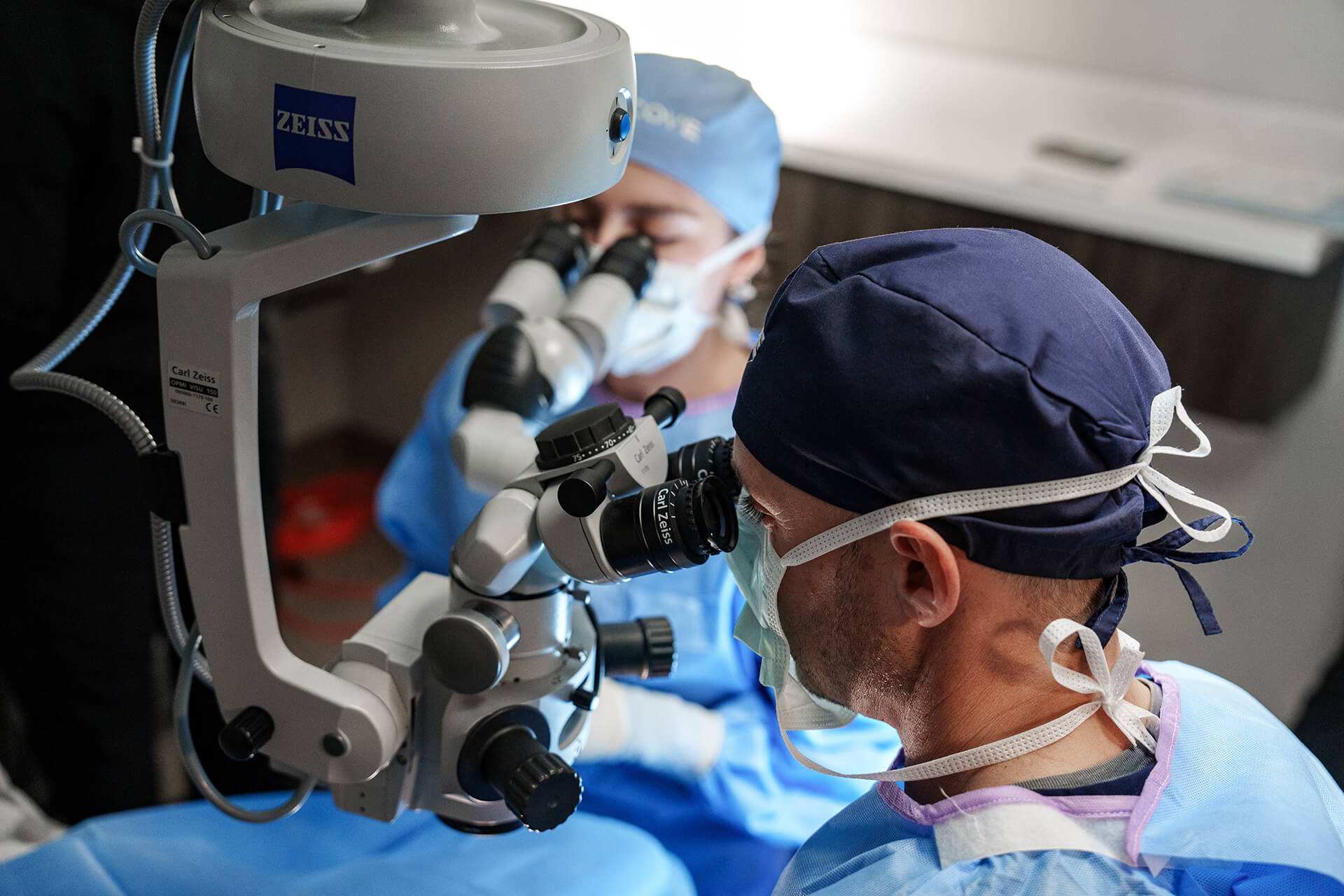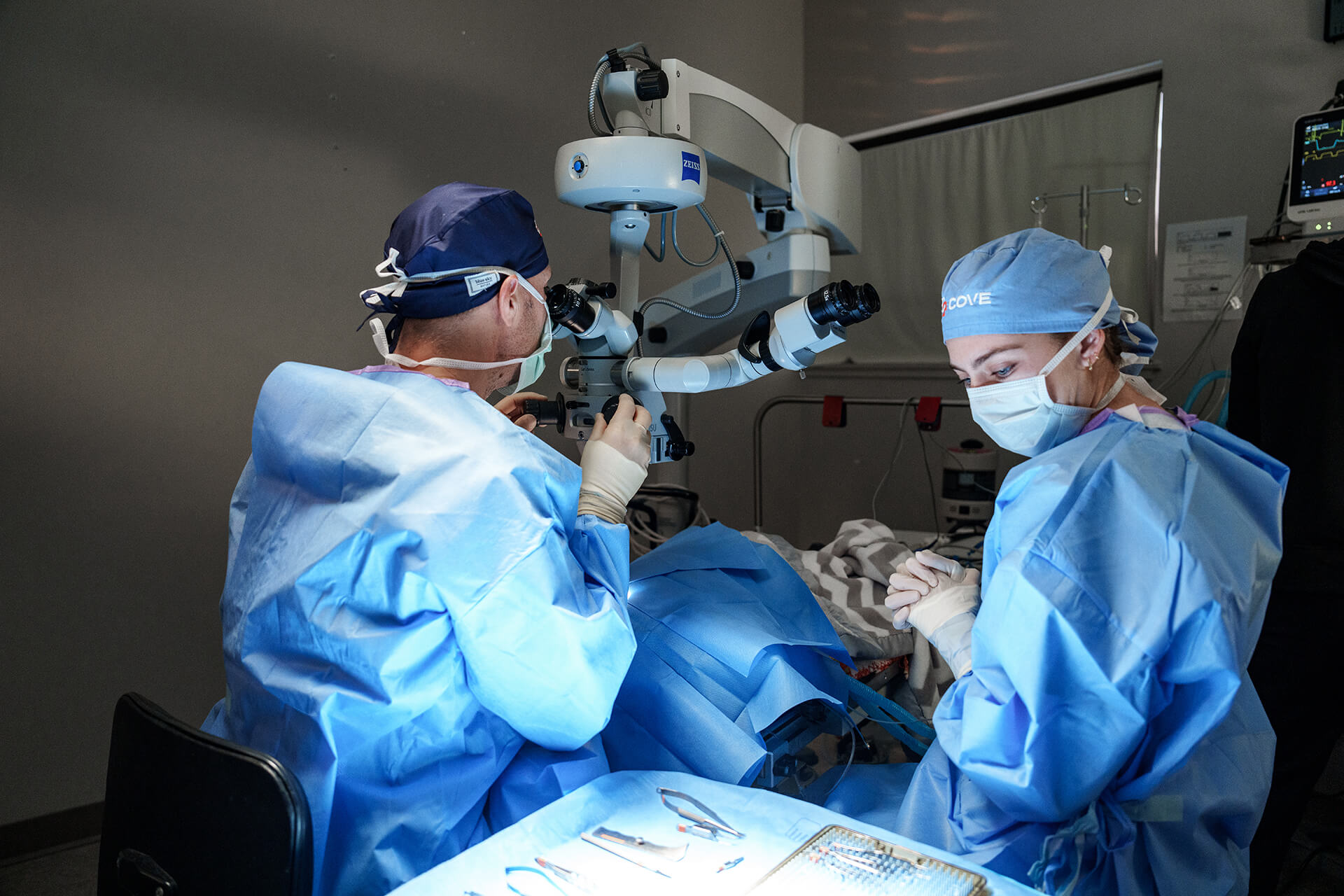Ophthalmology
Welcome to COVE Ophthalmology where we provide affordable specialty eye care for all types of animals.
Dr. Miller is an experienced board-certified ophthalmology specialist. Routine eye care is generally carried out by your family veterinarian, but some conditions require a specialist with advanced training and equipment to provide the best care for your pet. Dr. Miller will complete a comprehensive exam evaluating all parts of the eye with slit-lamp biomicroscopy and indirect ophthalmoscopy along with any other diagnostics necessary to diagnose the conditions.
Meet The Ophthalmology Team

Chrissy, RVT
Registered Veterinary Technician

Nannette
Ophthalmology Client Service Coordinator
At COVE Ophthalmology...
we offer all types of routine and advanced diagnostics to allow us to accurately diagnose your pets eye problems. Some of the comprehensive diagnostics offered at COVE are highlighted here:

Corneal staining with dye
Performed so that we can see ulcerations, evaluate health of the ocular tear film, and check patency of the nasolacrimal tear ducts.
Schirmer Tear Test (STT)
Provides the measurement of tear production evaluating both the amount of base tears and the ability of the eye to tear extra when needed.
Corneal and conjunctival cytology
Following sampling cells from diseased areas light microscopy is used to evaluate the types of inflammatory cells present and help determine if bacteria or fungal organisms are present.
Microbial culture and sensitivity
Culture allows specific identification of organisms causing infections and determination of the best antibiotics to treat these infections.
Tonometry
Measurement of intraocular eye pressures (IOP) to help diagnose and manage glaucoma and uveitis.
Gonioscopy
This test uses a special lens and magnification to evaluate the iridocorneal angle for changes that could be present with glaucoma or predispose animals to glaucoma later.
Electroretinogram (ERG)
This test is used to provide assessment of retinal function. It is carried out with conditions like cataracts prior to surgery when the retina can’t be visualized. It is also used to diagnose retinal diseases like Sudden Acquired Retinal Degeneration Syndrome (SARDS) and Progressive Retinal Atrophy (PRA) among other genetic diseases affecting retinal function.
Blood pressure measurement
Measuring the blood pressure is an important test in ophthalmology because elevated blood pressure can result in hemorrhages and detachment of the retina leading to blindness when severe.
Ocular ultrasound
This test uses a special ultrasound system to evaluate the eye and surrounding tissues for problems. Ultrasound is especially helpful in analysis of eye structures when they can’t be seen due to cataracts or other opacities.
Serology and PCR
These test look for infectious diseases like feline infectious peritonitis (FIP), blastomycosis, cryptococcosis, histoplasmosis, ehrlichiosis, Lyme disease, bartonellosis, toxoplasmosis, feline leukemia virus (FeLV), feline immunodeficiency virus (FIV), Rocky mountain spotted fever, etc.
At COVE we pride ourselves in our ability to treat all eye conditions with state of the art equipment and medications.
Dr. Miller is also passionate about ophthalmic surgery and will use his years of experience to provide the best possible outcomes for your pet’s surgical conditions.
Below is a list of medical and surgical conditions we routinely treat:

- Cataracts (phacoemulsification and intraocular lens replacement)
- Chalazion
- Cherry eye repair (prolapsed gland of the nictating membrane)
- Conjunctival grafts for deep corneal ulcers and lacerations
- Corneal conjunctival transposition
- Corneal endothelial degeneration or dystrophy
- Corneal sequestrum
- Corpora nigra cyst ablation
- Cryosurgery for distichiasis and other hair removal
- Diamond burr debridement for indolent corneal ulcers
- Diode laser cyclophotocoagulation for glaucoma
- Diode laser retinopexy
- Entropion
- Enucleation
- Eyelid mass removal
- Eyelid reconstructive surgery
- Glaucoma drainage device placement
- Golden Retriever Pigmentary Uveitis
- Keratoconjuctivitis sicca (dry eye disease)
- Laser Treatment for pigmented iris lesions and melanomas
- Lens luxation
- Ocular evisceration and prosthesis placement
- Pigmentary keratitis
- Proptosis
- Parotid duct transposition
- Subconjunctival drug device placement
- Thermokeratoplasty for severe corneal edema
- Uveitis

